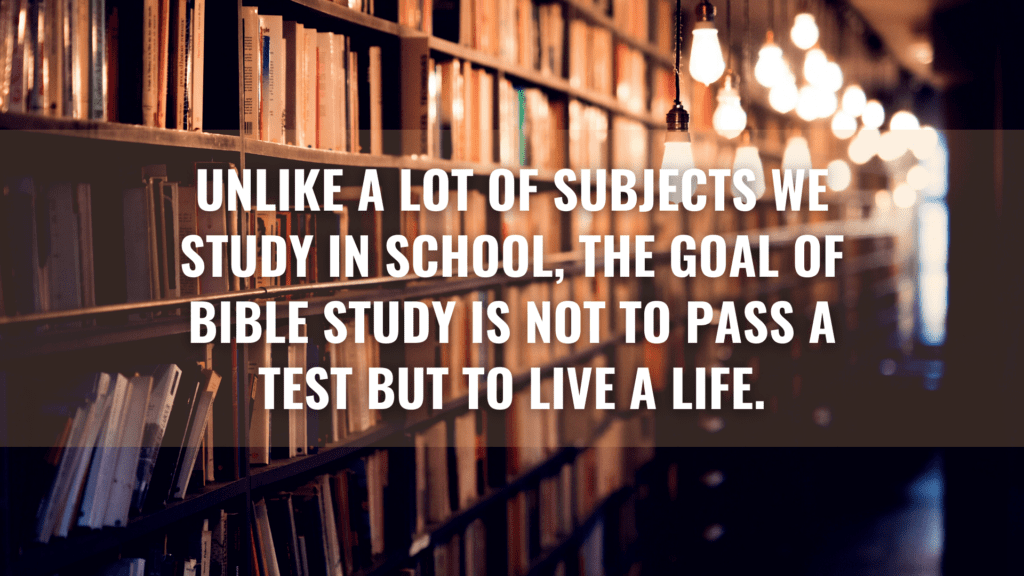There was a truck driver who attended the first church I pastored. He came across as a pretty simple guy. He was a contractor whose job it was to haul everything from gravel for building roads to oil rigs and to remove logs from the construction of said roads. This man was no “theologian,” but he knew a great deal of the Bible. In Sunday school, he often knew the answers to biblical questions that most people did not know. How did he know so much? Well, he paid attention in church and he listened to the Bible on CD as he spent his days driving.
How much biblical information do you know? How many sermons have you listened to? How much of the Bible have you read? How many Christian books are in your house? How many Scripture verses have you memorized? How many Bible studies have you been in?
One of the traps of religion is the belief that the point of learning is information but not transformation. We acquire knowledge, but the process becomes an end rather than a means to an end. Romans 2:12-13 says, “For all who have sinned without the law will also perish without the law, and all who have sinned under the law will be judged by the law. For it is not the hearers of the law who are righteous before God, but the doers of the law who will be justified.” According to Paul, the more we know, the more responsible we are, and the more God will judge us for our failure to obey.
The Christian life is a life of transformation. Knowing more should lead to change. Unlike a lot of subjects we study in school, the goal of Bible study is not to pass a test but to live a life. The goal is not to be merely hearers of the Word who amass information. The goal is to be doers of the Word who experience transformation.
When we come to faith, we are on square one of the Christian life. Change is beginning with the goal of our lives being transformed into the image of Christ. This leads to obedience to that which Jesus modelled and commanded. So the question needs to be asked, “What does it mean to be doers of the Word?“
In Luke 10:27 we read, “‘He answered, “‘Love the Lord your God with all your heart and with all your soul and with all your strength and with all your mind’; and, ‘Love your neighbour as yourself.’” This is what we know as the great commandment. We generally focus on the second half of the commandment to “‘Love your neighbour as yourself.”
As much as we focus on loving our neighbours, we forget it first comes out of loving God. Jesus said that the goal of the Word was to love God with all our heart. In other words, we are love God emotionally. Next, we are to love God with our soul, our spirit’s need to be in tune with God. Next, we are to love God with all our strength. That is a reference to our physical being. Finally, we are to love God with our minds, our mental life. Simply, to be a doer of the Word is to have a healthy relationship with God and healthy relationships with others. You are not biblical unless you are relational.
Paul says the same thing in his layout of the book of Romans. In Romans 1-11, the goal is how to have a healthy relationship with God. In Romans 12-16, the goal is to have healthy relationships with others, which is why the book ends with people who are named and loved.
The Great Commandment is the Christian’s life purpose statement. It is two-fold: love God and love others. The actions we are given to do come out of our relationship, our state of being as a child of God. But how are these truths lived out in the Christian life? In Fort St. John, our community’s ministerial lived by the motto: Committed to Christ, Caring for Our Community. God has given us the Bible, His Word to us. When we open our Bibles, we learn about God and deepen our relationship and faith in Him. When we open our lives to His Spirit, we care and love others as He intended. Committed to Christ, Caring for Our Community.
In many ways, these two principles are the foundation of the Christian life. They are like the pedals on a bicycle that moves us forward in the world to fulfil God’s purposes. But in doing so, we need to put effort into learning about God and knowing Him in a more personal way. The key to Bible study is to have a growing, healthy, transforming relationship with God and His people. When that is the focus, the Holy Spirit is very happy to show up in power to accelerate life change, healing, joy, and unity among people.
So let us make this personal. Has your relationship with the Scriptures honestly been more about information or transformation? If you want to make an impact in the world for the Kingdom of God, it starts with knowing God through His Word and experiencing Him by living out the truths you have learned with the world.

0 Comments